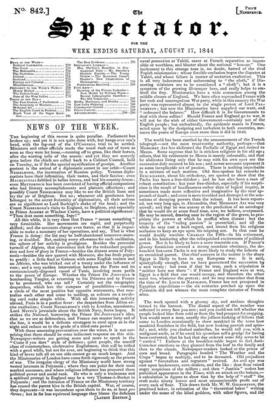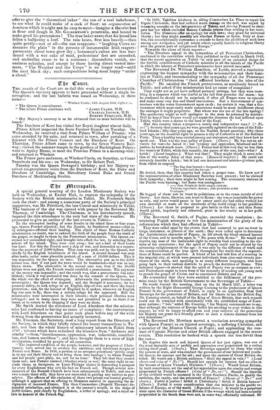The week opened with a gloomy sky, and anxious thoughts
turned to the harvest. The dismal aspect of the weather was reflected in every face you met ; and you could not tell whether the people looked blue from cold or from the bad prospect for cropping. You would meet a man, usually the jolliest-looking of fellows that come to London occasionally to show mankind in the town how mankind flourishes in the field, but now looking peevish and spite- ful ; and, while you clashed umbrellas, he would tell you, with a malignant smile, as if he owed his quondam self a grudge for having been contented, that he had that day ordered some fifty acres to be " carried "! Fathers at the breakfast-table began to feel Anti- Corn-law emotions as they glanced from the loaf to the family and then to the clouds. Newspaper-readers looked at the prices of corn and bread. Paragraphs headed " The Weather and the Crops " began to multiply, and to be devoured. Old prejudices against " forestallers and regraters " revived. An evil eye was cast upon landowners, corn-dealers, and the like : dear flour raised angry suspicions of the millers ; and then " Juatitia " makes her periodical appearance in the Times, with an attack on the bakers,— a calculation in figures to show that by the help of " stuff " the craft make ninety loaves and most unconscionable profit out of every sack of flour. This draws forth Mr. W. W. GILBERTSON, the practised baker, in refutation of the " theoretical baker " writing under the name of the blind goddess, with other figures, and the offer to give the " theoretical baker " the run of a real bakehouse, to see what he could make of a sack of flour: an argumentum ad hominern which it might not be easy to meet—imagine a theorist lost in flour and dough in Mr. GILBERTSOR'S penetralia, and bound to make good his pretensions ! The true baker avers that his bread has fallen a halfpenny a loaf. The rain beats, first less heavily—then quite gently—not at all—the sun reappears: "laughing Ceres re- assumes the plain" in the persons of innumerable Irish reapers : pavements about town grow dry ; horsemen's calves are less bur- dened with a wet cake of mud, pedestrians' feet are unsoaked, and umbrellas cease to be a nuisance : discomforts vanish, un- easiness subsides, and except by those having direct vested inte- rests, " The Weather and the Crops " is no longer read—until the next black sky ; such compositions being most happy "under a cloud."



























